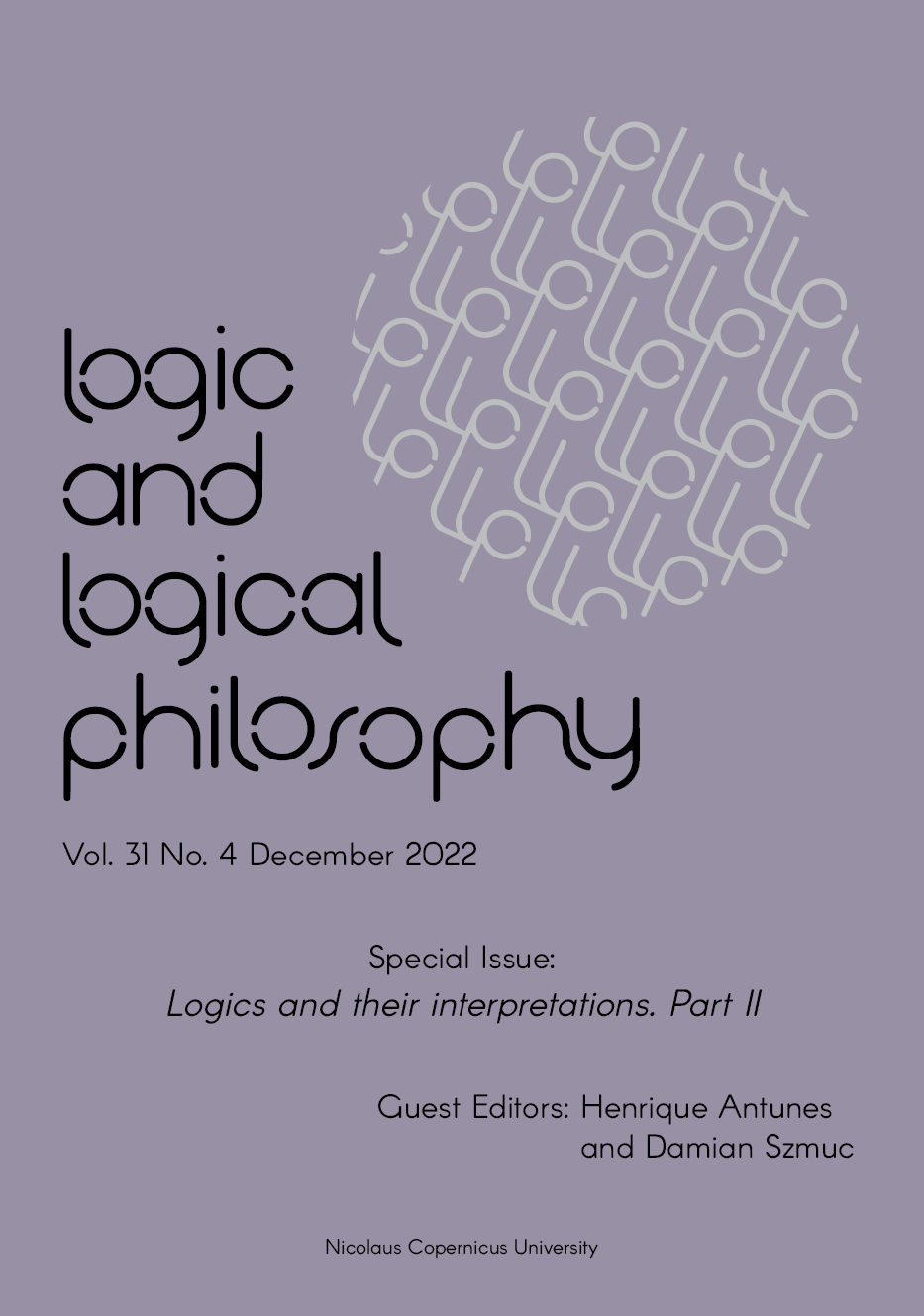Beyond Mixed Logics
DOI:
https://doi.org/10.12775/LLP.2022.014Keywords
many-valued logics, mixed consequence relations, mapping matrix, multiple conclusions interpretationsAbstract
In order to define some interesting consequence relations, certain generalizations have been proposed in a many-valued semantic setting that have been useful for defining what have been called pure, mixed and ordertheoretic consequence relations. But these generalizations are insufficient to capture some other interesting relations, like other intersective mixed relations (a relation that cannot be defined as a mixed relation, but only as the intersection of two mixed relations) or relations with a conjunctive (or, better, “universal”) interpretation for multiple conclusions. We propose a broader framework to define these cases, and many others, and to set a common background that allows for a direct compared analysis. At the end of the work, we illustrate some of these comparisons
References
Barrio, E., and F. Pailos, “Validities, antivalidities and contingencies: a multi-standard approach”, Journal of Philosophical Logic 51 (2022): 75–98. DOI: http://dx.doi.org/10.1007/s10992-021-09610-y
Bochvar, D. A., “On a three-valued logical calculus and its application to the analysis of the paradoxes of the classical extended functional calculus”, History and Philosophy of Logic 2, 1–2 (1981): 87–112. English translation of Bochvar’s paper of 1938. DOI: http://dx.doi.org/10.1080/01445348108837023
Chemla, E., P. Egré, and B. Spector, “Characterizing logical consequence in many-valued logics”, Journal of Logic and Computation 27, 7 (2017): 2193–2226. DOI: http://dx.doi.org/10.1093/logcom/exx001
Chemla, E., and P. Egré, “From many-valued consequence to many-valued connectives”, Synthese 198 (2021): 5315–5352. DOI: http://dx.doi.org/10.1007/s11229-019-02344-0
Cintula, P., and F. Paoli, “Is multiset consequence trivial?”, Synthese 199 (2021): 741–765. DOI: http://dx.doi.org/10.1007/s11229-016-1209-7
Cobreros, P., P. Egré, D. Ripley, and R. van Rooij, “Reaching transparent truth”, Mind 122, 488 (2013): 841–866. https://www.jstor.org/stable/24489584
Cobreros, P., P. Egré, D. Ripley, and R. van Rooij, “Vagueness, truth and permissive consequence”, pages 409–430 in T. Achourioti, H. Galinon, J. Martínez Fernández, and K. Fujimoto (eds.), Unifying the Philosophy of Truth. Logic, Epistemology, and the Unity of Science, Springer, Dordrecht, 2015.
Copilowish, I. M., “Matrix Development of the Calculus of Relations”, The Journal of Symbolic Logic 13, 4 (1948): 193–203. DOI: http://dx.doi.org/10.2307/2267134
Frankowski, S., “Formalization of a plausible inference”, Bulletin of the Section of Logic 33, 1 (2004): 41–52. DOI: http://dx.doi.org/10.2307/2267134
French, R., “Structural reflexivity and the paradoxes of self-reference”, Ergo 3, 5 (2016): 113–131. DOI: http://dx.doi.org/10.3998/ergo.12405314.0003.005
Halldén, S., The Logic of Nonsense, Ph.D. Tesis, Uppsala Universitets Arsskrift, Uppsala, 1949.
Kleene, S., Introduction to Metamathematics, North-Holland, Amsterdam, 1952.
Kripke, S., “Outline of a theory of truth”, Journal of Philosophy 72, 19 (1975): 690–716. DOI: http://dx.doi.org/10.1007/s11229-019-02344-0
Malinowski, G., “Q-consequence operation”, Reports on Mathematical Logic 24, 1 (1990): 49–59.
Pailos, F., “Disjoint logics”, Logic and Logical Philosophy 30, 1 (2021): 109–137. DOI: http://dx.doi.org/10.12775/LLP.2020.014
Pailos, F., “Empty logics”, Journal of Philosophical Logic (2021). DOI: http://dx.doi.org/10.1007/s10992-021-09622-8
Priest, G., “The logic of paradox”, Journal of Philosophical Logic 8 (1979): 219–241. DOI: http://dx.doi.org/10.1007/BF00258428
Ripley, D., “Conservatively extending classical logic with transparent truth”, Review of Symbolic Logic 5, 2 (2012): 354–378. DOI: http://dx.doi.org/10.1017/S1755020312000056
Ripley, D., “A toolkit for metainferential logics”, Manuscript.
Roffé, A. and J. Toranzo Calderón, “mapped_logics”, in A. Roffé, logics, version 1.0.1, 2021. URL: github.com/ariroffe/logics (last time consulted: 2022-03-25)
Scambler, C., “Classical Logic and the strict tolerant hierarchy”, Journal of Philosophical Logic 49 (2020): 351–3870. DOI: http://dx.doi.org/10.1007/s10992-019-09520-0
Sharvit, Y., “A note on (Strawson) entailment”, Semantics and Pragmatics 10, 1 (2017): 1–38. DOI: http://dx.doi.org/10.3765/sp.10.1
Szmuc, D., “Defining LFIs and LFUs in extensions of infectious logics”, Journal of Applied Non-Classical Logics 26, 4 (2017): 286–314. DOI: http://dx.doi.org/10.1080/11663081.2017.1290488
Tarski, A., “On some fundamental concepts of metamathematics”, pages 30–37 in J. Corcoran (ed.), Logic, Semantics Metamathematics, Indianapolis: Hackett Publishing Company, 1983 (1930).
Downloads
Published
How to Cite
Issue
Section
License
Copyright (c) 2022 Joaquín Toranzo Calderón, Federico Pailos

This work is licensed under a Creative Commons Attribution-NoDerivatives 4.0 International License.
Stats
Number of views and downloads: 1574
Number of citations: 0







